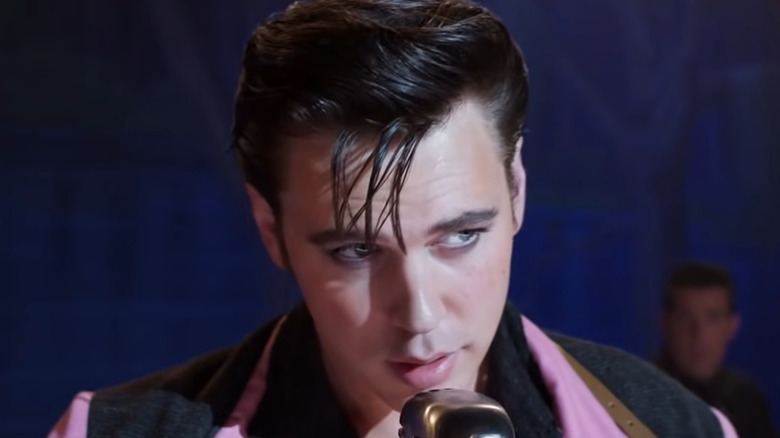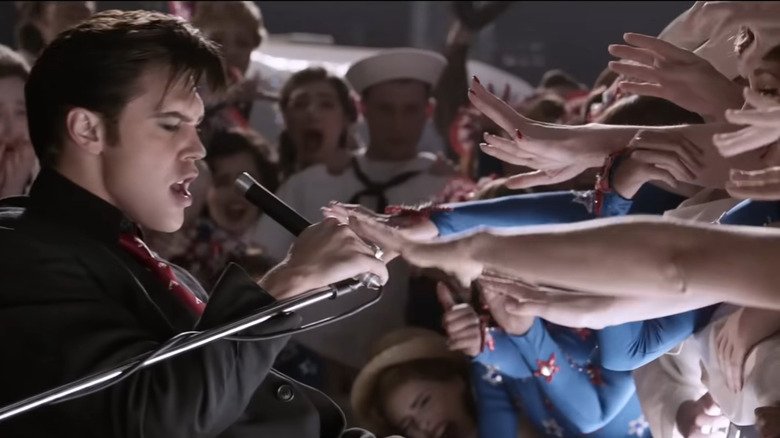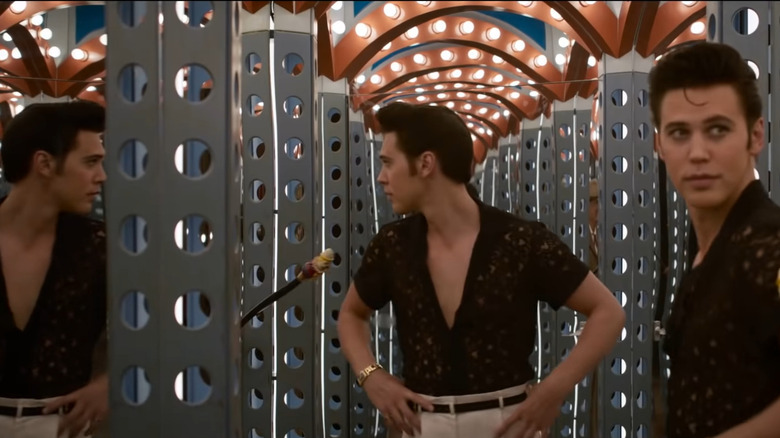Elvis Review: A Star-Making Turn From Austin Butler
- Baz Luhrmann's sense of theatricality
- Austin Butler's powerhouse performance
- Baz Luhrmann's sense of theatricality
- Wishy-washy on Elvis's politics
A young boy, running through the fields of rural Mississippi with his friends, comes across two buildings. In the first, there's a Black man singing rhythm and blues as two figures dance, their bodies hot as they writhe against one another. The other is a tent where church services are being held, bodies in rapture as they are filled with the Holy Spirit. These two seemingly opposite but complementary emotions would define the boy's — Elvis's — life and musical career: raw sexuality and the magnetism of a tent revival church service. Baz Luhrmann's "Elvis" is an operatic creation, one that is over-the-top and messy in places, yet in a way that suits its larger-than-life subject. It's all anchored by a stunning lead performance from Austin Butler, who breathes new life into Elvis.
"Elvis" follows the story of the developing career of the one and only Elvis Presley through the eyes of his long-time manager, Tom "The Colonel" Parker, played by Tom Hanks. Despite his seemingly benign presence, it becomes readily apparent that he has a showman's gift for manipulation, and he'll do anything to keep Elvis in his pocket. The Colonel is, unfortunately, one of the biggest issues with the film. Tom Hanks' bizarrely thick accent is distracting bordering on laughable, and while it becomes less jarring in regular conversation, he narrates the bulk of the first act. The depiction of Elvis's early career provides an opportunity for Luhrmann to embrace his worst excesses: It's a loud, frenetic blur of the first half of a VH1 "Behind the Music" special on uppers. If you like Luhrmann, you'll feel right at home; if you're less of a fan, you may find all of this just the tiniest bit grating.
As the film goes on, however, it does find a calmer sort of rhythm. Luhrmann could never be accused of subtlety, not by any stretch of the imagination, but there's a growing sense that he trusts Butler enough to slow things down, let scenes breathe, and give him the center stage without too many overproduced distractions. And if the Colonel's narration dominates the first 40 minutes or so of the film, the rest is Butler's baby.
Butler smolders as Elvis
When he's in full costume and makeup, he passes pretty well as a young Elvis. But his performance goes well beyond impersonation: Austin Butler is able to create a vision of Elvis that captures not just his seductive charisma, but his more vulnerable side as well, alternating between stubborn and weak-willed in a way that would make him the perfect mark for someone like the Colonel.
If the Academy was willing to give Rami Malek an Oscar for his performance as Freddie Mercury in "Bohemian Rhapsody," Butler deserves to be in a similar conversation. His physicality especially in the earlier years of Elvis's career makes you understand exactly why he made such an impact on teenagers at the time. Luhrmann makes a meal out of his first public performance, playing for comedy the primal urges that Elvis would unleash within the girls in the audience. But he's very effective at showcasing what a unique entertainer our boy was, bringing a different style of music to white teens across America.
That is sort of the elephant in the room in any film about Elvis, though: The fact that he made his fortune off marketing Black music to white audiences, without Black entertainers seeing a dime from it. And to be fair, "Elvis" doesn't ignore this dynamic. Elvis's friendship with B.B. King (Kelvin Harrison Jr.) is explored, as is his willingness to socialize with Black musicians and audiences in the Black part of town during a time when that wouldn't exactly win him a lot of friends. The film shows how the uproar over his hip-twitching dance style was in part racially motivated.
We see his reaction to the death of Dr. Martin Luther King, Jr., and it's clear that he cares. But the film doesn't go further than that, and it doesn't take the time to examine the fact that it doesn't go further than that. Neither does it delve into Elvis's more law-and-order right-wing tendencies later in life, and how we can reconcile these two equally established parts of him. It does just enough to make you wish that it was willing to interrogate these racial dynamics a little bit more.
A commentary on the toxic entertainment industry
It's a flaw in the film, to be sure, but it's hardly enough to ruin the experience. Overall, "Elvis" does an admirable job of bringing to life one of the most famous singers in American history. And if it doesn't tackle the admittedly Sisyphean task of contextualizing Elvis's role in civil rights, it takes a much stronger line on the predatory nature of the entertainment industry. There's an endless line of people ready to take advantage of Elvis, from his first days on the carnival circuit to his long residency in Las Vegas, of which the Colonel is just the most obvious.
They don't care what drugs they have to pump him full of, as long as he's able to perform — even his own father is complicit. It's difficult not to see echoes of this in our modern-day treatment of starlets like Britney Spears, who were micro-managed to unhealthy excess in a bid to keep the gravy train going. And if the film portrays him as 100% a victim, helpless in the clutches of greedy managers and hangers-on, rather than a man with some agency over his own life, it's at least a compelling story. The moments where he's able to assert himself as an artist, like the coup at the TV Christmas special, are where the film really shines. Of course, it's Elvis's tragedy that he's unable to make it stick.
"Elvis" has all the hallmarks of a Baz Luhrmann picture, and for some people, that may be enough to find it thoroughly insufferable. With all its pomp and opulence, it's certainly an acquired taste. But it's difficult not to be drawn in by the sheer charisma of Austin Butler's performance in the lead role — there aren't many actors who can play a character as iconic as Elvis and not come across like a mere impersonator, but he manages it. And as a whole, "Elvis" is bright, energetic, and always engaging.


